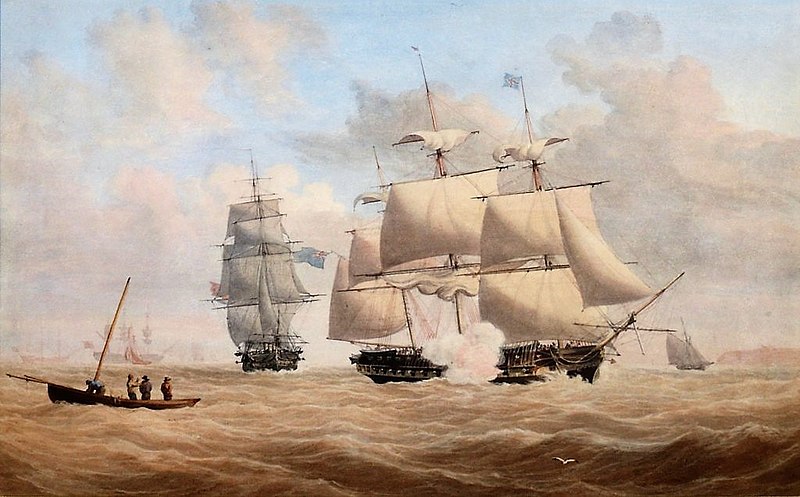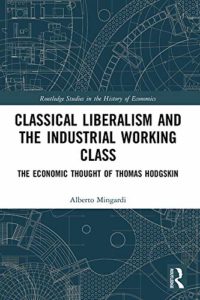Does Libertarianism Favor Labor?
By Arnold Kling


- Review of Classical Liberalism and the Industrial Working Class, by Alberto Alberto Mingardi.1
Thomas Hodgskin (12 December 1787-21 August 1869) was an English socialist writer on political economy, critic of capitalism, and defender of free trade and early trade unions. In the late 19th and early 20th centuries, the term socialist included any opponent of capitalism, at the time defined as a construed political system built on privileges for the owners of capital.
Intellectual historian Alberto Mingardi’s new biography of Thomas Hodgskin, Classical Liberalism and the Industrial Working Class, takes a different view of the 19th-century journalist and commentator. Mingardi argues that when understood in the context of his era, Hodgskin’s views were close to what we would today call libertarianism.
Mingardi concedes that Hodgskin’s sympathies lay with ordinary working people against the upper classes.
- The crucial issue therefore appears to be the legislative domination by those whom Hodgskin considers “idle,” not “productive,” classes as they live off private income. These privileged positions are a not natural consequence of the social division of labor; they are, in fact, parasitical to the division of labor. (39)
But Mingardi tells us that this did not make Hodgskin an intellectual cousin of Karl Marx or Thomas Piketty. Instead, Hodgskin saw government interference, not capitalist exploitation, as the force standing between workers and their fair share of income.
Mingardi suggests that Hodgskin came to his particular prejudices from his experience as a youth. Forced by his father to leave school and enlist in the navy at age twelve, his formative experience was aboard a ship, where the captain had absolute authority and corporal punishment was routine.
When the Royal Navy needed extra manpower, particularly in times of war, it would send “press gangs” to capture sailors from private ships–or even ordinary men on shore– and force them to help sail the warships. This form of slavery is where the phrase “pressed into service” comes from.
In 1813, now out of the Navy, Hodgskin wrote An Essay on Naval Discipline, expressing his opposition to absolute power and the use of force on board naval vessels. In 1815, he wrote a series of letters in a newspaper arguing against impressment. These helped launch him on a career in journalism.
Hodgskin’s political economy was self-taught. Mingardi sees Adam Smith as the theorist who made the strongest impression on Hodgskin.
Early in the 19th century in England, factories were a new phenomenon, spreading rapidly and frightening many observers. Critics saw factories as de-skilling workers. Hodgskin differed in that he saw machines as up-skilling workers and raising their standard of living.
Today, mainstream economists would analyze the effect of machinery on labor by referring to a neoclassical production function, in which output depends on capital and labor. But this approach has its problems. For one thing, it treats labor as homogeneous, when in fact there are a variety of skills and occupations. For another thing, it treats innovation as either “embodied” in capital or else “neutral,” meaning that it just appears as a deus ex machina, raising output. The concept of “human capital” sits awkwardly on the side of the standard neoclassical model. Mingardi shows that Hodgskin anticipated the idea of human capital. In fact, Hodgskin’s analysis may have even been more sophisticated, in that he saw innovation as embodied in labor. Hodgskin also was keenly aware that the factory system created specialized labor, not simply undifferentiated rote work.
Hodgskin was optimistic that workers’ skills and living standards were headed upward. He saw this improvement as the natural outcome of a market economy. If workers did not receive a fair share of prosperity, this was because government intervened on the part of the idle rich. Note that at the time that Hodgskin wrote, much of the power in Britain’s Parliament was concentrated in the hands of wealthy landowners.
Hodgskin’s more nuanced characterization of labor led him to see population growth as promoting prosperity. Mingardi quotes Hodgskin,
- The chances of improvement… are great in proportion as the persons are multiplied whose attention is devoted to any particular subject… an increase in the number of persons produces the same effect as communication [on longer distance]; for the latter only operates by bringing members to think on the same subject… Almost all discoveries and improvements have been made in crowded cities and in densely peopled countries. (72)2
Michael Munger on the Division of Labor and Paul Romer on Growth.
Mingardi notes that Hodgskin is suggesting that increasing the extent of the market through population growth has the same positive effects that Adam Smith saw arising from increasing the extent of the market through trade. I would add that the quoted passage seems to anticipate the growth theory that earned Paul Romer a Nobel Prize in 2018.
Among those who fancy themselves friends of the working class, Hodgskins’ opposition to government interference and support for free trade appear to go against the grain. Mingardi shows how such views can be reconciled. There are many people today, conservatives as well as progressives, who would do well to explore Hodgskin’s thinking as documented in Mingardi’s concise biography.
Footnotes
[1] Alberto Mingardi 2021, Classical Liberalism and the Industrial Working Class: The Economic Thought of Thomas Hodgskin. Routledge, 2020.
[2] The passage is from Hodgskin 1827, Popular Political Economy: Four Lectures Delivered at the Mechanics’ Institution.
*Arnold Kling has a Ph.D. in economics from the Massachusetts Institute of Technology. He is the author of several books, including Crisis of Abundance: Rethinking How We Pay for Health Care; Invisible Wealth: The Hidden Story of How Markets Work; Unchecked and Unbalanced: How the Discrepancy Between Knowledge and Power Caused the Financial Crisis and Threatens Democracy; and Specialization and Trade: A Re-introduction to Economics. He contributed to EconLog from January 2003 through August 2012.
Read more of what Arnold Kling’s been reading. For more book reviews and articles by Arnold Kling, see the Archive.
